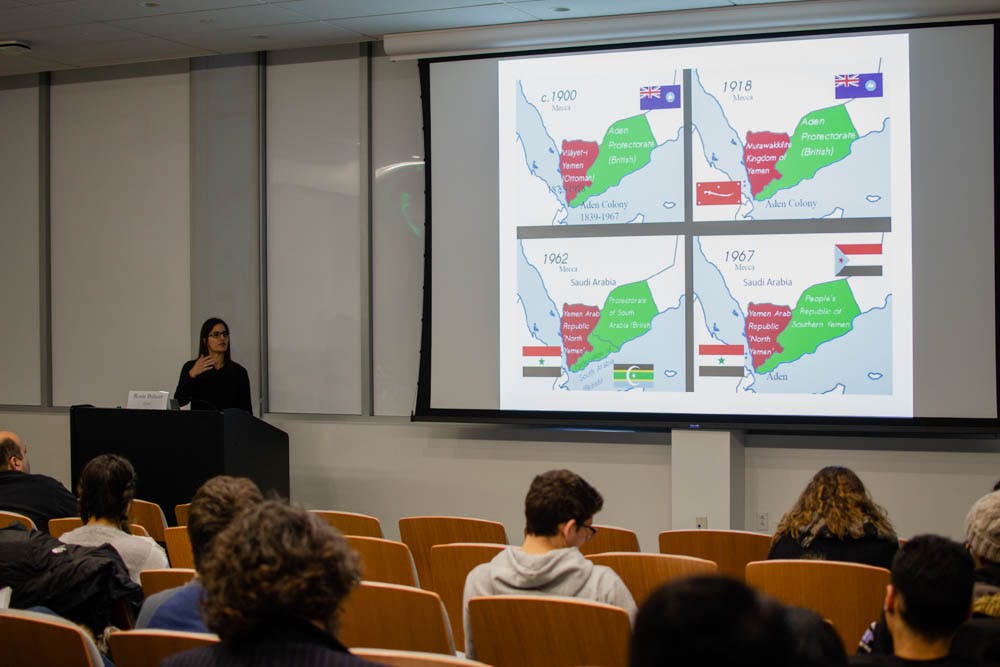Addressing faculty and students in the Stephen Robert ’62 P’91 Hall, Rosie Bsheer, assistant professor of history at Harvard, focused on the political narrative of the Yemeni war, the history surrounding the conflict and the factors that led to the crisis.
Bsheer stressed in her talk that powerful states on the Arabian Peninsula put forward narratives that hide the actual roots of Yemeni conflict. These roots are based in a long history of Saudi Arabian control and aggression, as well as powerful social movements in Yemen, she said.
“We are very privileged out of these settings to speak truth to power,” said Bsheer, who specializes in the history of the Arabian Peninsula and conducted research in Saudi Arabia from 2009 to 2012. “It’s very difficult, but if one really wants to know it’s possible.”
In her talk, Bsheer disagreed with the perspective that conflict in Yemen is rooted in sectarian, religious disagreements between Saudi Arabia and Iran. Instead, she said that social movements for rights and democracy within Yemen threatened Saudi Arabia, leading to war. “Sectarianism has very little to do with much of what is happening in the modern Middle East today,” Bsheer said. “Social movements are a big part of this history, but they are usually not factored into the many wars that Yemen has experienced.”
Bsheer also described how modern Yemen has rarely been ruled as a single political entity. Instead, Bsheer showed how different nations have controlled certain parts of Yemen, either through direct military intervention or through cultural interference via the funding of conservative religious institutions, which Saudia Arabia pushed in the 1990s.
“The Saudi government has since intervened each and every time there was a chance of democratic movements in (Yemen),” Bsheer said. Throughout the evening she underscored the extensive role that Saudi Arabia has played in Yemeni history, and the way in which the current war in Yemen continues to revolve around Saudi Arabia and its interests.
Bsheer recounted the long history of civil war in Yemen as well as the United States’ role in facilitating the ongoing war, which includes engaging in drone warfare after 9/11 and selling weapons to Saudi Arabia.
“What’s happening in Yemen is beyond what one can imagine, the suffering there,” Bsheer said.
Shahzad Bashir, professor of Islamic humanities and director of Middle East studies, was one of the leaders in bringing Bsheer to campus to speak.
“Yemen is a very undercovered topic, and there’s a huge humanitarian crisis happening in Yemen now that’s extended over years,” Bashir said, also mentioning that Bsheer was one of the few experts in the field in the entire United States. “In terms of our job of making this topic accessible to the academic community at Brown, this was an important thing to try and cover.”
“The powerful regimes on the peninsula have a lot of power in how their message is shown in the world,” said Bsheer, mentioning the sanitized version of events that Saudi Arabia often pushes to the West. “Anyone who tries to question this narrative will get in trouble.”
In a question-and-answer period after the talk, Bsheer was asked about the chance of peace in Yemen.
“If we allow people on the ground to accomplish the future they want, the futures they are fighting for, I see that as grounds to a peaceful resolution,” Bsheer said. “But that will never happen, because Saudi Arabia will never let that happen. They don’t want a democratic government on their southern border.”
Correction: A previous version of this article misquoted Hafithe AlGhosain GS. The quote has been removed from the story. The Herald regrets the error.





